Spotlight on the 2004 Independent Games Festival
Learn all about the latest and greatest from the world of independent game developers. This feature includes profiles for all 20 finalists for the 2004 Independent Games Festival, as well as download links for trial versions of the games.
Throughout the past couple of decades, the process of game development has evolved from hobbyists working out of their garages to legions of highly specialized developers working together in sprawling, multimillion-dollar campuses. As the game industry has grown into a 10-billion-dollar-a-year industry, so too have the production budgets for the games you buy off the shelf today. It isn't unusual to see the development costs of some titles reaching into the millions of dollars. In spite of the fact that megapublishers seem to draw most of the attention these days, the indie spirit of game development lives on. Anyone who has played Tetris knows that it doesn't necessarily take a seven-figure budget to create an entertaining piece of software.
The annual Independent Games Festival celebrates the achievements of independent developers. Similar to the Sundance Film Festival of the film industry, the IGF serves as a showcase for quality games that are created without the financial backing of a major publisher. The festival is put on every year by the CMP Game Group, which is also well known for its production of Game Developer magazine, Gamasutra.com, and the Game Developers Conference, all of which are great resources serving the needs of game developers worldwide.
The 2004 IGF will be the sixth iteration of the contest. It includes 111 entrants, representing 18 different countries. The field has been whittled down to 10 finalists in each of two categories: Web/Downloadable and Open. Games that play within a browser window or that are distributed as a single, self-extracting executable under 15MB in size qualify for the Web/Downloadable category. All other games fit into the Open category.
The following pages include summaries of all the 2004 IGF finalists, written by GameSpot staff. What we found is that these games are all very deserving of their status as IGF award finalists. Many exhibit exceptional creativity and sound design principles. Some even offer production values rivaling those of any mainstream game.
Most of these games have free demo versions available to the public. We encourage all of our readers to try these games out and learn firsthand that not all great games are promoted by flashy TV commercials or full-page magazine ads.
Developer: Selectparks
Genre: Simulation
Selectparks' acmi {{park}} is a first-person multiplayer exploration game created for the Australian Centre for the Moving Image, an organization dedicated to helping the public enjoy the many different types of media involving motion pictures. The game itself lets you explore the ACMI facility, which has been faithfully and meticulously re-created in 3D. The insides and outsides of the buildings are accurate models of those that really exist in Melbourne.
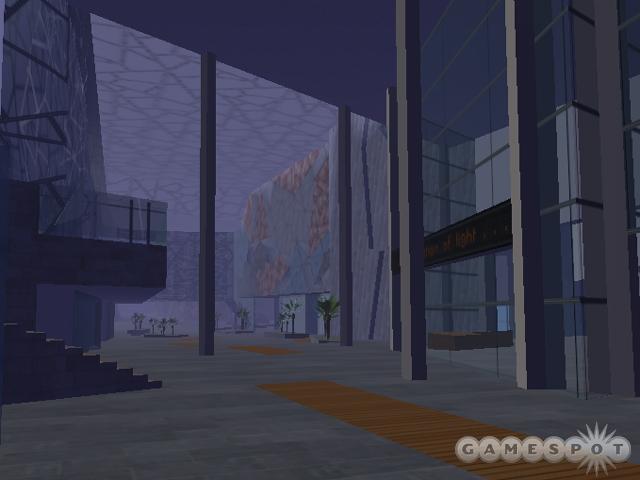
However, outside of the ACMI facilities lies a fantastic and beautiful world that is intended to provide both visual and aural stimulation. An example of this would be what is called the "Scratch Rink," a large, flat surface that emits a variety of sounds when you walk on it. As you move along the surface, the sound that is emitted changes pitch, which is a simple mechanic that nonetheless leads to more immersive interaction. There are a number of other areas where you can interact with the environment to engage in similarly engrossing activities. These diversions, coupled with a surreal and rich landscape, provide a nice contrast from the ACMI facilities, which are, of course, firmly grounded in reality.
Interaction with other players is done primarily by using "light balls," which you can shoot out at other players or objects. Besides producing a nice shimmering effect, the balls produce different sounds as they bounce off objects. If there were a number of players all shooting these light balls at one another, it would produce an interesting cacophony of sounds; this would help to foster cooperative gameplay between players.
Playing acmi {{park}} is most certainly a captivating experience. Even if you can never actually make it to the real-world ACMI, this game gives you an accurate depiction of the center itself, with the added bonus of an enchanting outside world.
Developer: Anino Entertainment
Genre: Action RPG
Download the demo
Anito: Defend a Land Enraged is a single-player, point-and-click action role-playing game in the vein of some of the more popular dungeon crawlers currently available in today's gaming market. The game puts you in the dual roles of siblings Agila and Maya, who must locate their missing father and help restore order to the fictional land of Maroka, which is being torn apart by war. Each character is playable separately, and their unique storylines intertwine as the plot progresses.
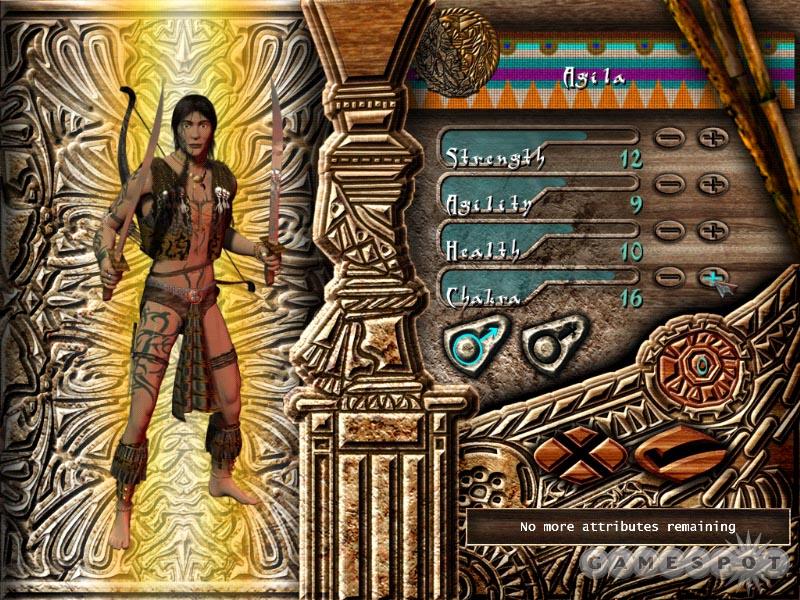
Anito's interface is fairly easy to navigate, and it lets you perform a number of different tasks without getting too bogged down with keyboard navigation. By moving the mouse over items and people, you can either inspect or interact with them, depending upon which icon you select with the right mouse button beforehand. Engaging in combat requires you to simply press a button to put your character into a battle stance, and then clicking on the enemy you wish to attack will cause your character to do so. Each character also has upgradable abilities in the categories of strength, agility, health, and chakra. Chakra is essentially the game's version of magic, which allows you to perform varying types of spells, depending on your character's strength in that area. You also will experience day and night cycles throughout the game and therefore will need to manage realistic eating and sleep schedules.
Anito uses a graphics engine that blends 3D and sprite-based graphics in a pretty unique way. The game also features an isometric camera view, as well as an art style firmly rooted in traditional fantasy fiction. The world of Maroka is a large one, complete with five fully populated towns and more than 150 different characters to interact with.
Developer: Circular Logic
Genre: Puzzle
Download the full game
Bontãgo is a single- or multiplayer puzzle game that involves dropping colored blocks from the sky. Though that might sound like a familiar premise, the game bears only a passing resemblance to the classic block-puzzle game Tetris. Instead, you play the game on a circular playing field over which your next block piece is suspended and onto which your next block piece eventually lands. Occasionally, you may drop a piece on top of a special "gift" piece, causing a random event, such as the appearance of an erupting volcano.
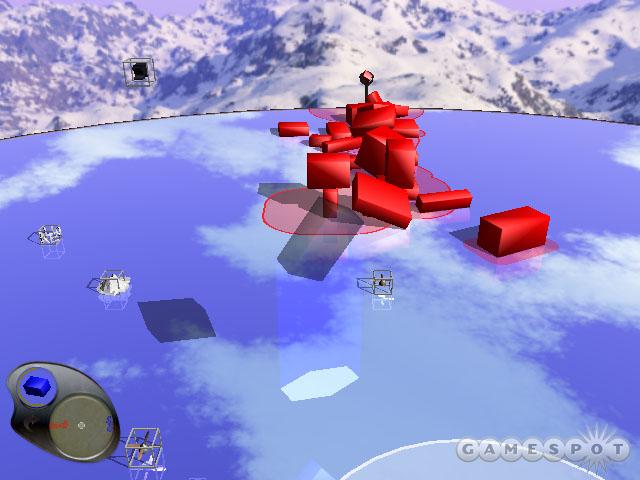
Instead of trying to get your pieces to fit together, you're trying to get your pieces to land as close to each other as possible without bouncing or flying off onto another part of the board. When you're successful, these pieces will form a continuous path toward your goal: a flag in the center of the board. You can place new blocks only on top of, or very close to, previously placed blocks. Bontãgo also has a physics model that causes poorly placed blocks to bounce off each other or knock down your earlier blocks, which may disrupt any path you may have built previously. The game's control scheme is entirely mouse-driven by default (you move your mouse up, down, left, or right to scroll across the game board, and you use your mousewheel to raise or lower your next piece), though you can modify your configuration. You're awarded more points for dropping new pieces successfully onto the board from a higher height, though doing so will often cause poorly placed pieces to bounce much higher than usual, increasing the possibility of knocking over your previous blocks and destroying whatever progress you may have made in forging a path to your goal. The game uses simple, colorful 3D graphics and features a looping piano concerto soundtrack.
Developer: Interactivestory.net and the Georgia Institute of Technology
Genre: Interactive Drama
Grace and Trip are a married couple with a few relationship issues that stem from the minor fact that they can no longer stand each other's company. In Façade, you visit the terrible twosome (ostensibly your friends) at their swanky apartment to catch up on some college memories, only to get caught in the middle of a no-holds-barred marriage explosion. Accusations fly, misunderstandings abound, snide comments are wielded like weapons, and you have a front-row seat for buried resentments and emotional distress.

The key to Façade is your character's direct and indirect ability to guide the constantly flowing narrative based on what you say and do. There are no dialogue trees, branching paths, or menus to navigate as you interact with the couple by moving around the apartment and typing whatever you'd like to say. Relationship carnage will always happen around you even if you say absolutely nothing, frozen in the face of severe marital dysfunction--these two are determinedly bitter--but you can also take sides or serve as an intermediary. What gets revealed along the way is often subtly dependent on how you interact with the environment. If you happen to enter their apartment and then stand by Grace's atrocious collection of glass figurines, for example, she'll come over and tell you about how she's not happy with the way her decorating has turned out. Trip will insist that you walk over to another wall and admire his picture from their second honeymoon in Italy. Though the evening's ultimate outcome is pretty much inevitable, there's lots of variation along the way and all sorts of chances to tell your friends that they're both nuts, though they don't seem to mind terribly much.
If you're one of those lucky souls who know only sane, well-adjusted people and you'd like to get a taste of caustic irrationality and loads of drama, Façade is a perfect opportunity.
Developer: My Game Company
Genre: Puzzle
Download the demo
If you converted Tetris into a dress-up game, you'd probably end up with something close to Fashion Cents. Instead of trying to fit blocks neatly into a vertical space, the goal of this game is to take the pieces of clothing you're given and create entire matching outfits--headwear, tops, bottoms, and shoes--on the 10 dolls you're given as workspace. Once you've created a full outfit on a doll, the clothing is placed into your shopping bag, and the doll is available again to build a new outfit. You can gain bonus points for using optional accessories like purses and sunglasses and by finishing off outfits with successive pieces for a combo bonus.

The clothing colors have to be perfectly coordinated to register as a match, although white and denim pieces can act as wildcards, and two-toned tops can also increase your flexibility. While the early levels are pretty easy, with just four primary colors to worry about, later levels introduce additional colors like pink, orange, and turquoise. Thankfully, special items like bleach (turns a piece of clothing white) can help get you out of a tight spot as you start running out of storage space and places to affix new clothing pieces.
If after loading up Fashion Cents you still have some shred of doubt that the game is aimed squarely at girls and women, that uncertainty evaporates the moment you try to match a green skirt to a pink blouse. A female voice with a thick Valley-girl accent screams out "Like...ewww!" in protest, to indicate an invalid move. Despite the obvious target audience, male puzzle-game fans who can get over their macho instincts will still find Fashion Cents to be pretty fun. With enough practice, maybe Fashion Cents can even help fashion-challenged players to avoid landing on reality shows like Queer Eye for the Straight Guy or What Not to Wear.
Developer: Gastronaut Studios
Genre: Puzzle
Fuzzee Teevee throws you into a world that's hopelessly dependent on the viewing of television. But to the horror of couch potatoes everywhere, a dastardly and mysterious group known only as the "librarians" has taken control of the mother satellite, the high-flying device that beams the warm, glowing images to the homes of millions. These librarians are bent on preventing the sedentary masses from watching any more television, so through a mix of puzzle and action gameplay, you'll have to stop them and restore everyone's favorite passive pastime.

The gameplay is set up in classic puzzle-game fashion. Each stage presents you with a new game board covered with blocks and orbs, the essential components of the coveted TV signal. You'll have to pick up and throw blocks and orbs of like colors in order to form chains and dissolve the pieces. Multiple chains can be put together to cause chain reactions and net you even greater point bonuses. In the single-player game, it's just you against the evil designs of the librarians, but Fuzzee Teevee also contains a multiplayer component (for up to four players, all on the same PC) that lets everyone involved compete to see who the biggest couch potato is.
If you're in the mood for classic action puzzling on the PC, veg out with Fuzzee Teevee.
Developer: S2 Games
Genre: Action Strategy
Download the demo
When you think of indie games, games like Savage: The Battle for Newerth probably aren't the first to spring to mind. For one thing, Savage is currently available in retail stores, and it's a high-quality production from start to finish--that is, it bears little trace of being a small-time production, and, in fact, it spent a good two years in development and cost between $1 and $1.5 million. Still, it's the first offering from upstart developer S2 Games, whose relatively small but dedicated team pulled off a game that's good enough to compete with the big guys.

For another thing, Savage provides a unique gaming experience that simply isn't available anywhere else. It does so by combining the fundamentals of competitive multiplayer action gaming with competitive multiplayer real-time strategy gaming. You join forces with either the remnants of human civilization, which has devolved into a tribal hunter-gatherer society, or the forces of the beasts, a gaggle of manlike creatures locked in a perpetual conflict with humankind. One player on each side must always serve as commander for his team, overseeing his side's progress via a real-time-strategy-style bird's-eye view. Most players assume the role of various soldiers, but they can stop to gather resources for their side or go out and try to mount an attack.
Savage is a complex game that equally demands and rewards teamwork. The game allows well-organized teams to execute spectacular assaults, involving magic, siege weaponry, tactical feints, and much more, and the game is structured so that pitched battles may ensue despite one side or another seeming to get the upper hand.
Savage is a unique game that's being actively supported by its developers as well as by a vocal following of fans. The game stands as an excellent example of how independent game developers can still put together a unique and competitive product amid today's tough market.
Developer: Slitherine Strategies
Genre: Strategy
Ancient Sparta had some of the most feared warriors in history, and the goal of this epic turn-based strategy game is nothing less than conquest of the ancient Aegean world. Contrary to its appearance, Spartan isn't like the Total War series of strategy games, nor is it a real-time strategy game. Rather, it's a game all about empire building through diplomacy, trade, research, and war.
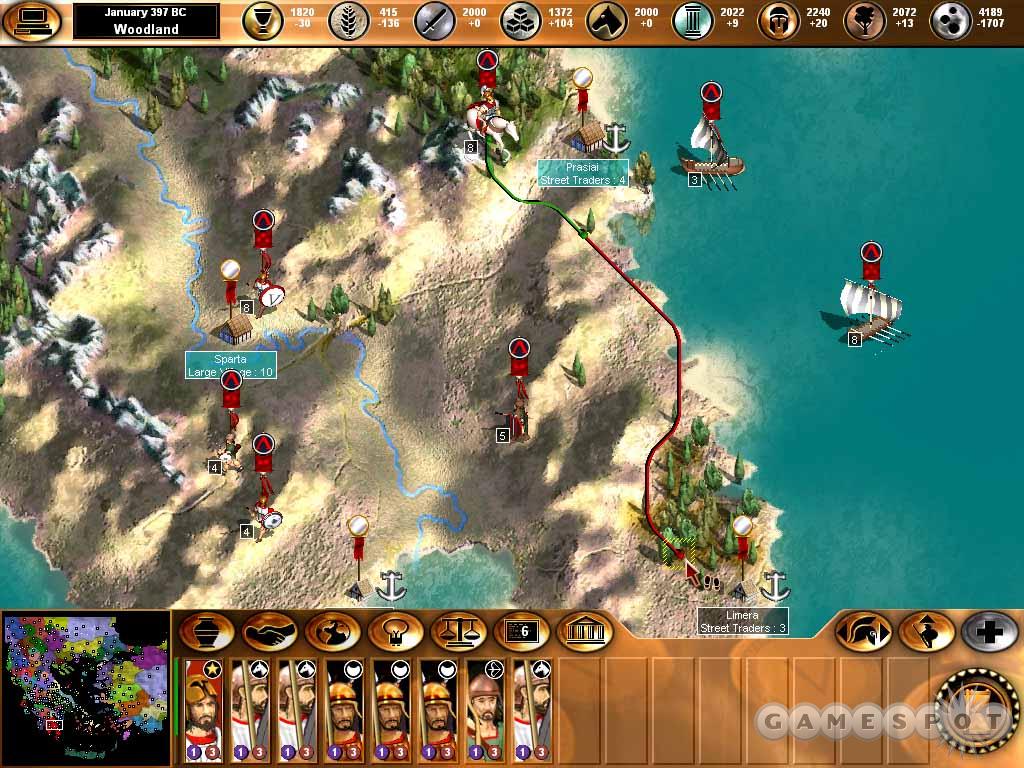
Spartan is a game of considerable depth. For example, there are more than 100 playable nations in the game, including virtually every tribe and city-state that existed during that era. When you think about it, the amount of historical research required for the playable nations alone is staggering. As befitting a turn-based strategy game, there are a variety of diplomatic options and trade agreements that you can form with your neighbors, or you can choose to spy on them. You can research new technologies, build epic structures like the Acropolis, and more.
The game takes place on a beautiful 3D campaign map, and there are 3D battlefields that allow gigantic battles, with up to 16 squads on each side. (There's also an option to run battles in 2D for low-speed machines). In addition to all the land battles, there will be plenty of naval combat and naval invasions among the many islands of the Aegean Sea. And, to top it all off, there will be multiplayer support, so you and your friends can take sides and wage ancient war on a personal level. Developer Slitherine Strategies is still looking for a publisher for Spartan, but this could certainly be the definitive strategy game about ancient Greece.
Developer: Destroyer Studios
Genre: Space Simulation
Download the demo
With a development timer ticking around the six-year mark, Starshatter is one space simulation that's certainly been around the block. Featuring similarities to other games in the genre, Starshatter starts you off as a space fighter pilot in a Wing Commander-like game, but as you progress through its campaign, you'll eventually find yourself in charge of fleet carriers, warships, and full complements of fighters.
Starshatter also appears to be heavy on options. Even in its currently unfinished state, the game boasts three different flight physics models and four controller types. On top of that, you'll pilot different ships throughout the game's one currently available campaign. While you'd expect most space simulators to stick to space, Starshatter will also have planetary missions that take you inside a planet's atmosphere. Here you'll be able to employ air-to-ground weapons to take out terrestrial targets.
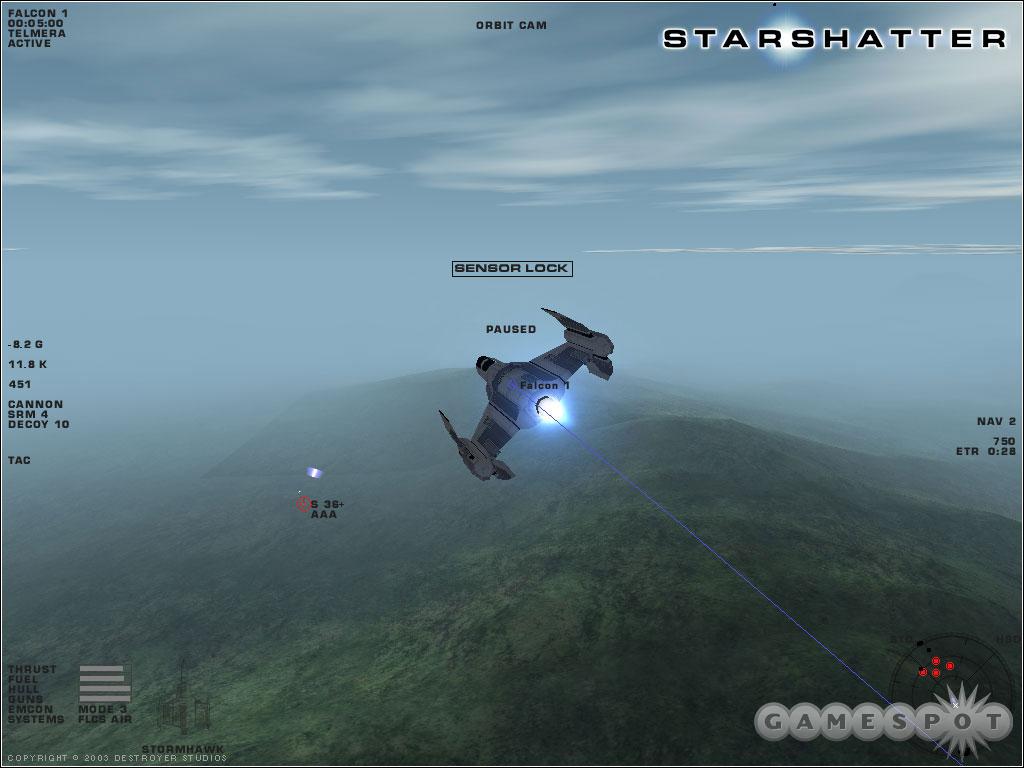
The biggest option maker in Starshatter, however, is the game's deep mod support. The built-in mod support makes it easy to enable and disable different mod options. You can even simultaneously enable multiple mods to create your own custom cluster of game options. Some mods are already in development for Starshatter, including one based on Babylon 5, which should be ready as soon as Starshatter is completed.
The developers behind Starshatter call it "a full-featured complex space simulation that sits somewhere between FreeSpace, Falcon 4.0, Homeworld, and Harpoon." Considering the different mission situations, extensive add-on support, and exhaustive control options, we tend to agree.
Developer: MadMinute Games
Genre: Strategy
One half of the two-man team that makes up MadMinute Games has a powerful love for traditional historical wargames, a love that comes through loud and clear in the developer's game Take Command: 1861 The Civil War. Using a simple homebrewed 3D engine, the game puts you on one side of many real historical Civil War battles, as well as in scenarios created specifically for the game. Take Command doesn't concern itself with the resource management and high-level military trappings seen in many current real-time strategy games; it instead puts the focus squarely on tactical strategic combat. Though you'll regularly be commanding several thousand troops, the game minimizes micromanagement by only giving you direct command control over battalions. The game still gives you plenty to do, though, as you have pretty extensive control over battalion movement and formations, which, when you're commanding a half-dozen different battalions at once, can be a full-time job.

Take Command definitely takes aim at the fans of statistics-heavy tactical strategy games, giving you plenty of different variables to consider--the morale, fatigue, and health of your troops, whether they have enough ammunition to actually survive a battle, even the route you choose to take to the battlefield will have an effect on how you perform in battle. It's clear that the lion's share of the two and a half years of nights and weekends that the designer and programmer spent building the game was used to imbue it with as much statistical and historical accuracy as possible rather than to throw on loads of visual polish. The 3D engine that powers Take Command isn't jaw-dropping, but it serves its purpose. This is, without a doubt, a wargame made by wargamers, for wargamers.
Developer: Large Animal
Genre: Puzzle
AlphaQUEUE is an isometric, space-themed puzzle game. The playing surface consists of a checkered board with "sheds" on its edges. Each of these sheds contains one of several differently shaped pieces. The object of the game is to strategically align these differently shaped pieces onto a game board in a specific pattern, and your only interaction throughout the game will be to push pieces out of the various sheds. You will use this simple mechanic to try to push the correctly shaped pieces to the spaces where they need to go. Once you have gotten all the pieces in the correct position, you'll be able to advance to the next level. Each level has its own par, and the number of turns it takes you to beat a given level is the game's sole scoring system.
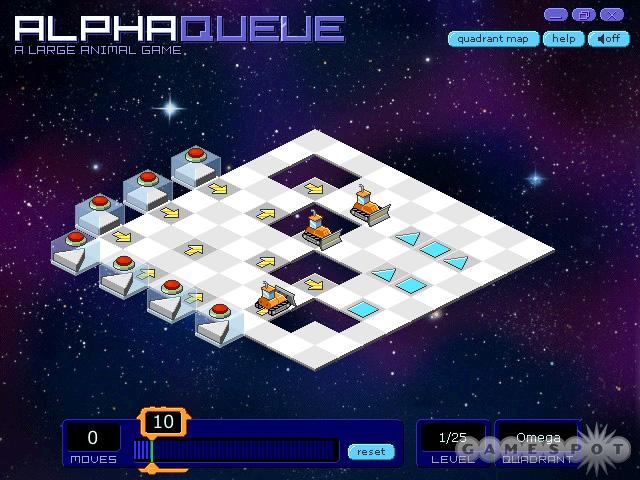
Each level becomes increasingly more complex with not only more shapes added, but also certain other elements that require timing. For instance, in some levels, a "sweeper" comes along a specific track. He can push your pieces out of the position you intended, or, if you plan correctly, he can push them into a more strategically advantageous position. Additionally, you can actually change his path by timing a move to push him off-course. The game does quickly ramp up its difficulty and requires you to consider your moves well in advance if you want to make par.
While the graphical presentation is relatively simple--a board fixed in space--the three-dimensional nature of the playing surface makes it a little more interesting than if it were just a two-dimensional top-down view. This is certainly a nice touch, as is the synth soundtrack that plays throughout the levels.
Given that the sole interaction in the game is to click on different sheds to push out differently shaped pieces, it's very simple to learn. However, something else you'll notice very quickly is that it takes a very long time to master. AlphaQUEUE is definitely a thinking gamer's game.
Developer: Flashbang Studios
Genre: Puzzle
Download the demo
You could probably compare Beesly's Buzzwords to a union between every family's favorite letter-scrambling game, Boggle, and the Bust-A-Move series. The premise is simple: You are a bee named Beesly, and it's up to you to stock up your hive's honey supply for the year. In order to do this, you are presented with a honeycomb-like structure, with letters inside each comb. Your goal is to make words out of connectable letters within the comb. Any letter touching another letter can be connected, and you can spell words going in any direction. Depending on the number of letters used, and the complexity of the word, a score is awarded for each word, which in turn fills up your honey pot. Once a word has been created, the used combs disappear, leaving you with fewer letters to choose from. However, at the end of each "season"--effectively the game's answer to a basic round structure--a new line of letters will drop down, replenishing your supply.
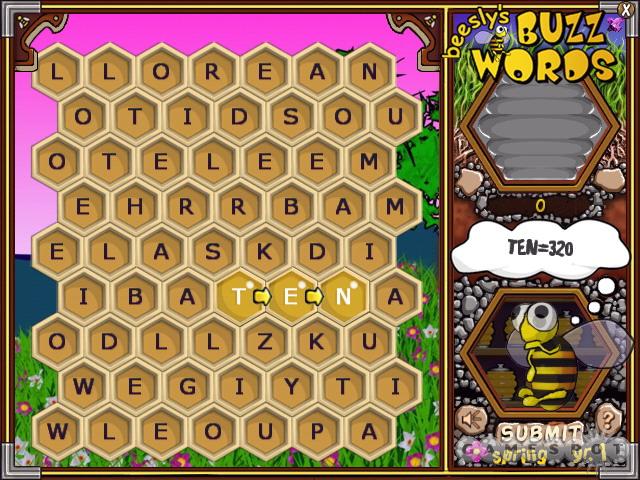
Beesly's Buzzwords features three different modes of play: classic game, challenge game, and action game. Classic game follows the aforementioned gameplay progression; challenge game is essentially the same as classic, though a score (usually a very high one) is set at the beginning of the game for you to clear; and action game continuously adds letters to your comb, challenging you to fill up the honey pot before your comb fills up completely. The game also features some simple but eye-pleasing flash visuals, as well as some oddly soothing classical tunes that make up the in-game soundtrack.
Though Beesly's Buzzwords is an altogether simplistic effort, its puzzle-themed gameplay is remarkably addictive and should appeal to any fan of vocabulary-based puzzle games.
Developer: Shizmoo.com Games
Genre: Parlor
Play this game
Billiard Boxing is a browser-based game that spawns in a new window once you install a program from host site shizmoo.com. You play as either a white or black billiard ball with eyes. By right-clicking your mouse on your ball, you can determine where you'd like an invisible cue stick to strike your ball--doing so shows a simple shadowed line that roughly indicates where your shot will go. The game features believable billiard ball physics with respect to bank shots and ricochets, and like on a real pool table, you can't apply much force to a shot if your ball is stuck near other balls (because, on a real-life table, you wouldn't be able to lean your cue stick against the table for momentum). It also features a twangy, simplistic country-and-western-style background music track as you play.

The object of the game is to sink all balls of your type (stripes or solids) before sinking the eight ball (if you prematurely sink the eight ball, you automatically lose). But as the game's name suggests, there's also a combative aspect to the game. You can aim your billiard ball to crash into your opponent's (which causes the eyes of your opponent's ball to become stunned "X's"), hopefully sinking it into a side or corner pocket. This causes your opponent's ball to briefly disappear from the table, then reappear as an insubstantial "ghost" ball that passes through other balls, giving you time to sink extra shots. The game tallies high scores and keeps them in a running ranking. Billiard Boxing exists solely as a two-player multiplayer game with text chat functionality, though most players will wait until after a match to start typing in messages (otherwise, they'll lose the opportunity to make another shot).
Developer: Astromanic Games
Genre: Puzzle
Download the demo
Most zoos and animal parks discourage patrons from feeding the animals, but that's the whole point of Chomp! Chomp! Safari. You'll need to place the right type of food next to the right type of critter to fill its belly and advance through this addictive tile-based puzzle game, which has you stuffing the faces of monkeys, lions, zebras, crocodiles, and more. While you can feed each animal individually, you can also feed groups of the same animal with a single food item if their tiles are adjacent to one another, triggering chains. You can also place numerous food items and then set off massive feeding-frenzy chains to clear the board of ravenous creatures. These techniques are necessary to advance, particularly in later stages.

There are actually several game modes to choose from, and each has a slightly different emphasis that will appeal to different sorts of gamers. Puzzle mode presents an untimed board with a limited amount of food, and you'll have to think carefully about where to place that food to clear the stage and move on. Adventure mode requires you to feed all the animals and continue on your safari, but there's a hunger meter that steadily fills, and your game will end if you're not serving up dinner fast enough. Additionally, there are obstacles in adventure mode, like rocks and tree stumps, that you'll need to clear away with dynamite--but if you use too much dynamite, the animals will stampede! Poachers will also set up huts in vacant spaces if you don't hurry up and either blast the poachers or fill the spaces with food. The last mode, attack mode, gives you a set number of animals to feed and then steadily drops more tiles on you, Tetris-style, until you've either met your quota or been buried by beasts. Racking up points in the adventure and attack modes will unlock bonus stages and earn you chomp bucks, which you can spend on things like extra continues.
If you've ever taken issue with those "Don't Feed the Animals" placards, or even if you're just a puzzle game enthusiast, you'll want to go on a Chomp! Chomp! Safari.
Developer: Digital Eel
Genre: Shooter
Download the demo
The premise of Dr. Blob's Organism is that one of your scientific experiments has gone awry. An amoeba-like organism is growing out of control in a petri dish, and you have to blast it into submission. The presentation of the game is simple, as is the interface--you use one button to fire and the arrow keys or the mouse to rotate the dish. You can damage the organism by firing at the nucleus of the cell as it grows, moving, undulating, and budding out pieces of itself in an attempt to break free. If you let the blob touch the sides of the petri dish too many times, it's game over.
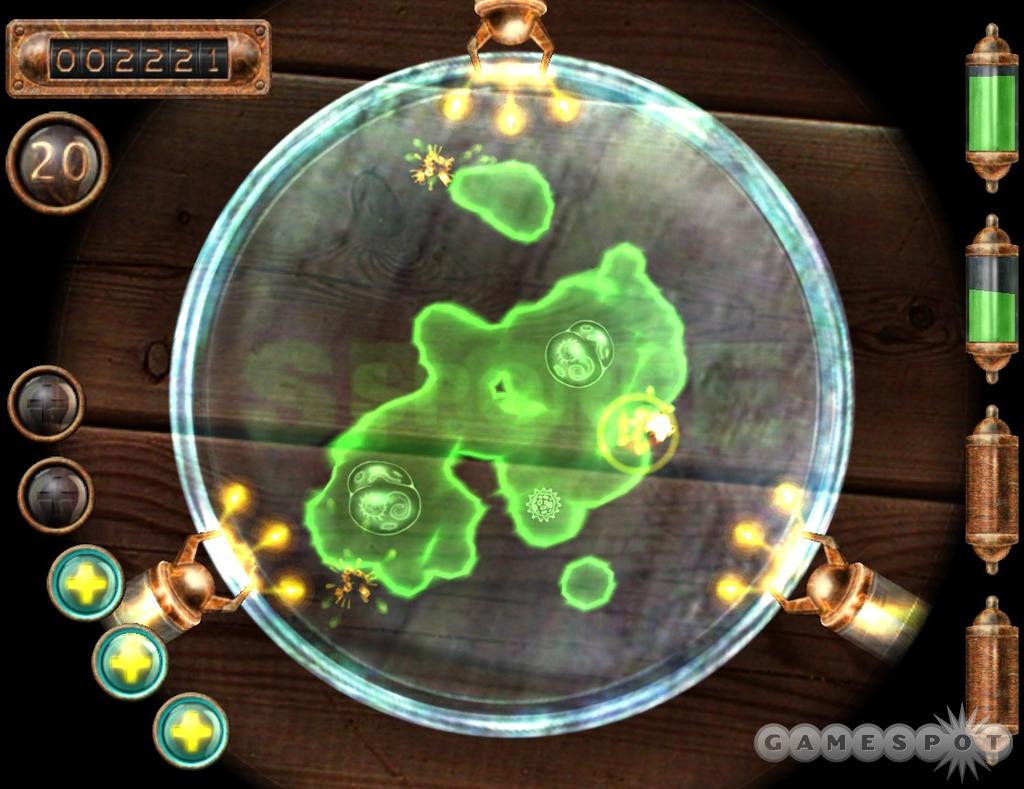
Thankfully, the strange organism spawns numerous weapon power-ups and extra health chances as you blast away at it. These power-ups include multiguns, a faster-firing blaster, lightning, and freeze rays, but these only last a few seconds before you're back to shooting with your regular blaster. The organism has its own power-ups as well, such as force field, which renders it immune to attack for a short period of time as it grows and moves about the dish.
Like any good shooter, Dr. Blob's Organism succeeds in putting you into a Zen-like trance as you concentrate on the target and rotate the dish frantically in an effort to keep the blob off the walls. The random nature in which the organism moves and grows ensures that no two games play alike, and there are no specific patterns to recognize. After a few rounds of Dr. Blob's Organism, you just might feel more inclined to do something about that slimy shower curtain in your bathroom.
Developer: Robinson Technologies
Genre: Puzzle
Download the demo
At first glance, Dungeon Scroll looks like a first-person dungeon crawl in the style of the old Dungeons & Dragons PC RPGs. If you spend more than five seconds with the game, though, you'll realize that all the fantasy trappings are just window dressing for a fiendishly difficult and addictive word puzzle game. The concept is simple: You're given eight letters at the start of each dungeon, and you battle the creepy inhabitants (such as snakes, skeletons, and zombies) by forming words from these letters. The amount of damage you inflict and the points you rack up are based on the length and complexity of the words you devise.

Sounds simple? Hardly. There is, of course, a catch: You can use each word only once per level. So if you blow through all of the quick three-letter words you can think of on the piddly little rats and snakes at the beginning of the level, when you finally get to that dragon with 60 hit points at the end, you're pretty much out of luck. Dungeon Scroll basically operates with a time limit, since you'll constantly be attacked by your foe while you're trying to figure out a word. Fortunately you'll receive a handful of one-use extra letters and bonus tiles that give you special powers after defeating each monster. Healing potions will restore a little bit of precious health, while some letter tiles will add bonus damage value to a word. Strategic use of your available letters and knowing when to save a big word for the next enemy are the key to survival.
Dungeon Scroll is an amazingly fun little game that really puts your vocabulary and quick-thinking skills through the wringer. Also, here's an interesting bit of peripheral geek trivia: The author, Seth Robinson, created the classic Legend of the Red Dragon BBS door game that may well have been many gamers' first taste of online multiplayer gaming. LORD was great fun more than a decade ago, and Robinson's latest effort is no less enjoyable.
Developer: Chronic Logic
Genre: Platform
Two weeks and two grand were all it took to make Gish, a one-of-a-kind 2D side-scroller featuring an innovative twist: The gameplay is entirely based around physics. You play as Gish, an amorphous ball of tar that kind of just rolls and squishes around. He's apparently in search of Brea, his similarly proportioned love interest, and to reach her, he'll need to puzzle his way through a series of challenging levels, manipulating the environment, avoiding traps, and more.

Gish isn't your standard platforming hero. For one thing, he has no appendages whatsoever and merely rolls around. However, his near-viscous body allows him to access areas that normal creatures can't. His most notable ability is to grow spines at the touch of a button, allowing him to scale and travel along vertical or upside-down surfaces. Other than that, Gish can jump, and in many cases you'll need to roll him along a ramp and launch him off to wherever you need him to go. Pushing certain objects, bypassing obstacles and hazards, and other such elements are central to the single-player game, which is part platformer, part puzzle. The unique controls and believable character and environment physics ultimately make Gish a rather distinctive game.
There are a couple of two-player modes, for good measure. One is sumo wrestling, sort of an American Gladiators-style contest in which Gish and Brea must try to push each other off a wobbly platform. All this is set against a most excellent backdrop that's clearly reminiscent of E. Honda's home turf in Street Fighter II. The other multiplayer mode is football, in which black and gray must try to push the ball past each other and into their opponent's end zone.
Gish even has some cool frills to it. Brief sequences in between stages display some clever humor, presenting none other than Gish himself as the star of many famous motion pictures. Is Gish truly the world's next big star? Be sure to try the game for yourself and you'll see!
Developer: Mind Control Software
Genre: Strategy
Imagine Civilization as a fast-paced turn-based arcade game, and you begin to get the idea that's behind Oasis. Oasis is a game about ancient civilizations and the barbarian waves that plagued them. Many a nascent society was wiped out due to marauding barbarians, and your job is to prevent that. You play as a long-lost Egyptian pharaoh returning to a shattered kingdom. The only trouble is, you have no idea where anything is. So you have to explore the map, locate the lost cities, link them up by roads, and prepare for the next barbarian onslaught.
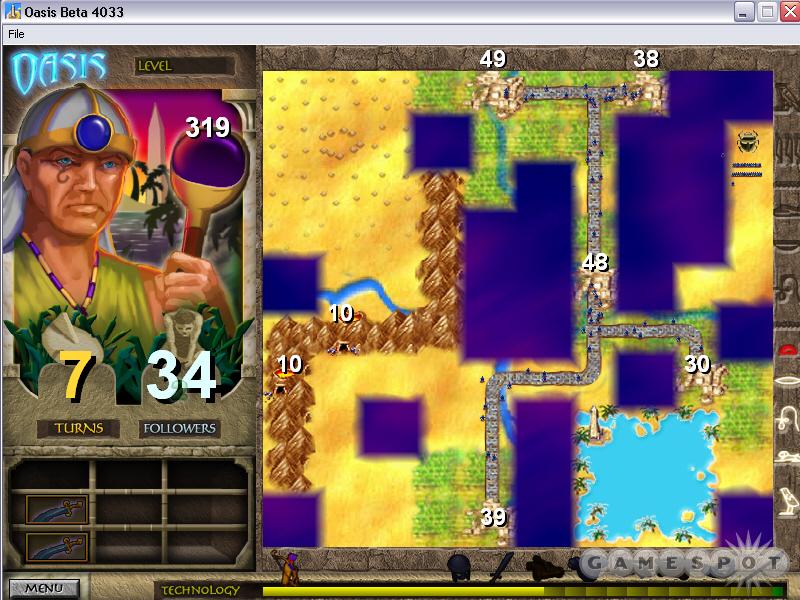
Depending on the difficulty level, you have only about 60 to 80 turns before the barbarians appear. During that time, you have to explore the map and locate your cities. Once you've located them, you can use workers that you've gathered to build roads to connect the cities together. Once connected, cities will begin to grow in population, and, more importantly, you can use roads to move people around. If you're lucky, you'll have also uncovered the point on the map where the barbarians will enter, so you'll want to concentrate your populace in the closest city to that point so they can repulse the invaders. If you don't know where the barbarians will appear, you'll have to guess. Either way, the goal is to prevent the barbarians from wiping out all your cities from the map.
The game takes its name from the fact that you can also uncover a magical oasis on each map. Doing so uncovers a powerful scarab artifact, and if you progress through the game far enough, you'll be granted special upgrades and technologies that make your job easier. The oasis also represents your weapon of last resort; if the barbarians manage to wipe out your cities, they'll head for your oasis next. The more power you've accumulated, the more likely you'll repel the invaders. If you don't, well, don't worry. Civilizations were a dime a dozen back in those days.
Developer: Mistaril
Genre: Strategy
Download the demo
Space Station Manager does exactly as its title implies--it lets you build and manage your own space station. You'll choose from different parts and form your own structure, but you'll have to keep track of things like the flow of energy and life support from one section of the station to the next. You'll also have to turn a profit to make sure your space station can continue to grow.
You can start from scratch with only a little bit of money to get started, or you can choose from a handful of prebuilt starter stations and dive right in, but either way you play it, the game remains the same. You are tasked with designing a functional space station by adding various modules to the station's structure. Adding solar panels allows the station to collect more energy, which it needs to power things like your life-support systems and crew modules. Manning the station gives you a crew that can conduct experiments in a laboratory module, which in turn provides funding for further station development.
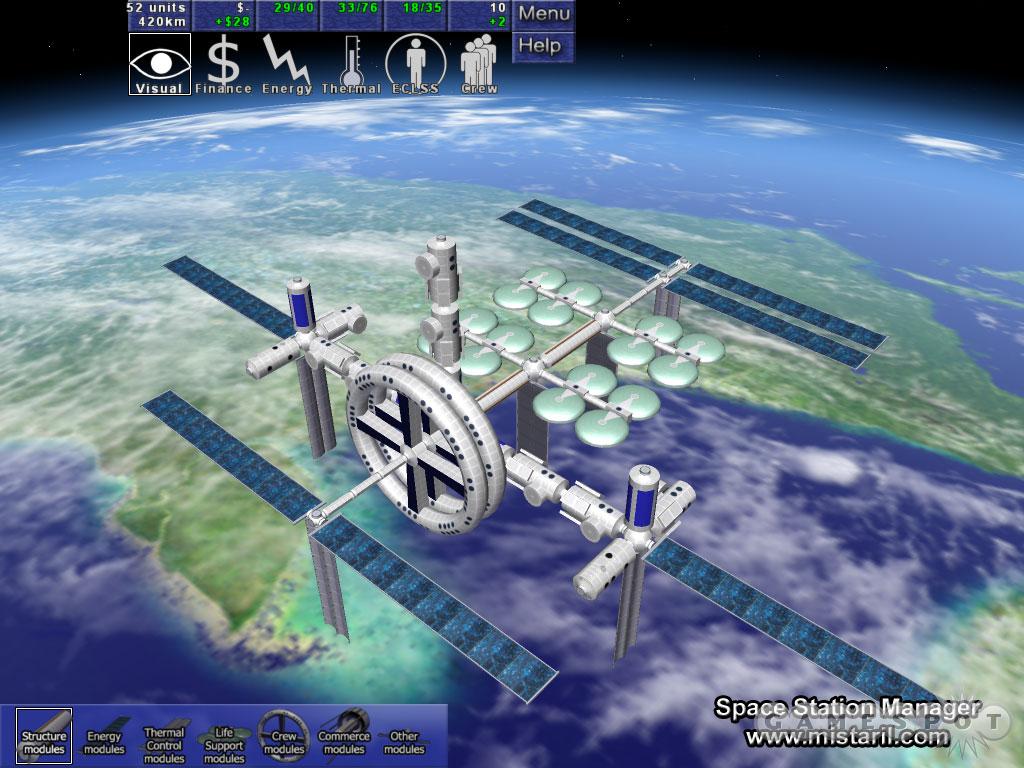
You'll also have a series of specific goals to reach. As you fulfill requirements, such as making a 15-unit station or getting your thermal or energy flow up to specific numbers, additional station modules become available for use. On top of that, the game allows for the downloading of additional modules, some of which are player-created.
Space Station Manager also allows you to separate the building from the management portion of the game, if you wish, so you can just spend some time connecting the modules in ways that you find pleasing. Furthermore, the whole game takes place over a relaxing shot of the spinning Earth.
Developer: Three Rings Design
Genre: Massively Multiplayer Puzzle
Download this game
Three Rings Design's Yohoho! Puzzle Pirates combines two seemingly disparate elements--pirates and puzzle games--and puts them into a massively multiplayer online RPG setting. The Java-based world of Yohoho! Puzzle Pirates offers plenty of activities for swashbuckling sea dogs. All of your seafaring activities--sailing, navigating, bilging, gunnery, carpentry, and swordfighting--are accomplished through simple puzzle games. Alternately, if you don't have very strong sea legs, you can stay on land and try your hand at a trade. Currently, the only trade available is distillery--the fine art of making rum--though Three Rings promises games for other trades, including weaving, smithing, shipwrightery, and tailoring, among other skills that would serve the needs of buccaneers who have come to port. The games themselves are all relatively simple affairs, many of them modeled after existing puzzle games such as Bejeweled and Puyo Pop, though Yohoho! makes extended play more appealing by including a large number of unique puzzles.

Adding purpose to all the puzzle games is a persistent world with tens of thousands of players and a player-sustained economy, which is driven largely by the trafficking of goods such as wood, iron, hemp, spices, and sugar cane, as well as the occasional chest of buried treasure, and, of course, plenty of good old-fashioned piracy. The game also features a strong social element. You can challenge other players to swordfights or drinking contests at random, keep a list of your "mateys," and form your own pirate crew. Keeping in line with the accessible puzzle games that make up the meat of Yohoho! Puzzle Pirates, the game's visuals feature colorful island locales and pirates that look something like Lego people crossed with Playmobil people. You can be sure to hear plenty of "Yarr!" and "Avast ye!" shouts while playing as well. If nothing else, Yohoho! Puzzle Pirates is certainly a change of pace from your average MMORPG.
| Game File | Description | File Size |
| AlphaQueue Demo | Puzzle through enigmatic tilesets in this demo for Large Animal's isometric puzzle game. | 6.2 MB |
| Anito: Defend a Land Enraged Demo | Try one of the full game's two playable characters in this demo, and check out one of five towns, plus other environments, a tutorial, and some early quests. | 271 MB |
| Beesly's Buzzwords Demo | Link up honeycomb letters to help Beesly spell words in this demo. | 6.9 MB |
| Billiard Boxing Game | Billiard Boxing is a browser-based game of simultaneous, competitive pool. Sink your billiard balls before your opponent or even pocket him to gain an advantage. | n/a |
| Bontago Full Install | Get the full version of this DigiPen real-time strategy project. This version includes music and high-resolution backgrounds. | 35.6 MB |
| Chomp! Chomp! Safari Demo | Feed the hungry animals before running out of time or food in this demo that requires quick reflexes and sharp strategy. | 2.7 MB |
| Dr. Blob's Organism Demo | Blast feisty one-celled organisms as they try to escape from a petri dish in this fast-paced demo. | 6.7 MB |
| Dungeon Scroll Demo | Try out this challenging word game adventure in a time-limited demo. | 3.9 MB |
| Fashion Cents Trial Version | Go on a spree in this shopping game in this trial, which includes ten dolls, a bunch of clothes, and some in-game help to get you started. | 19.1 MB |
| Puzzle Pirates Client | ||
| This massively multiplayer game puts you in the role of a pirate. You'll play various types of puzzle games that simulate pirate jobs like rum distillation and ship bilging. | 12.8MB | |
| Savage: The Battle for Newerth v2.0 Demo | This updated demo was released in conjunction with the European launch of the game. It represents the most recent v2.00d update, and includes the same two maps (Eden and Crossroads) as the original demo. | 240 MB |
| Space Station Manager Demo | Give Mistaril's space station management and construction game a try with this playable demo. | 4.3 MB |
| Starshatter v3.9.0 Demo | This official demo includes the updates submitted for the IGF competition, such as a revised interface, new multiplayer support, new ships, new star system graphics, a "virtual joystick" mouse option, and more. | 68.9 MB |
Innovation in Audio: Dr. Blob's Organism
Innovation in Game Design: Oasis
Innovation in Visual Art: Dr. Blob's Organism
Technical Excellence: Yohoho! Puzzle Pirates
Seumas McNally Grand Prize: Oasis
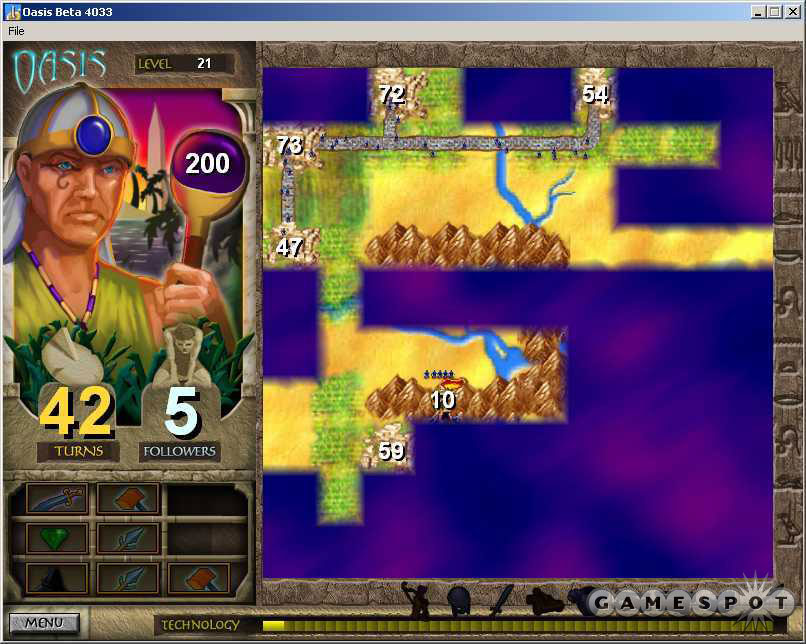
While the GameSpot office favorite, Dungeon Scroll, failed to win any awards in its category, it's easy to see why Oasis came away with the big prize. Any game that can take the best parts of Civilization and distill them into a faster-paced, easier-to-learn (but still addictive) strategy game is awesome, as far as we're concerned. The fact that matches are measured in minutes instead of hours also helps with the level of accessibility. The game still offers plenty of strategic depth as you work to explore your territories and set up your cities before fighting off barbarian invasions.
Innovation in Audio: Anito: Defend a Land Enraged
Innovation in Game Design: Bontãgo
Innovation in Visual Art: Spartan
Technical Excellence: Savage: The Battle for Newerth
Seumas McNally Grand Prize: Savage: The Battle for Newerth
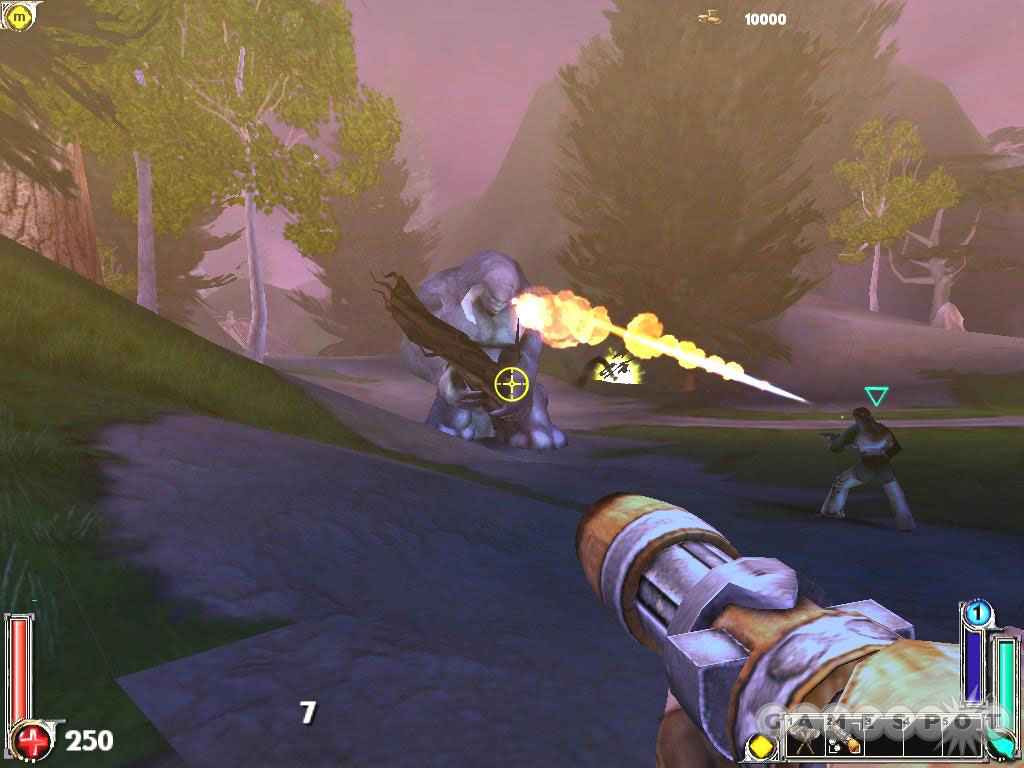
It would be far too cynical to dismiss Savage's award as a product of S2 Games' much larger production budget relative to the other entrants. The simple fact is that this rookie developer stepped up to the plate and smacked a home run in its first at-bat, creating a game with production values and polish that rival games made by big-name publishing houses. S2 Games has succeeded in melding multiplayer action and strategy in a manner where others, including Microsoft (with Allegiance), have failed. Most impressively, S2 Games has continued to offer close support for its product after launch, a practice that much bigger publishers and developers ignore all too often. Because it's such a solid game, and S2 Games continues to improve upon it, it's no surprise that Savage earned top honors at this year's Independent Games Festival.
Got a news tip or want to contact us directly? Email news@gamespot.com
Join the conversation